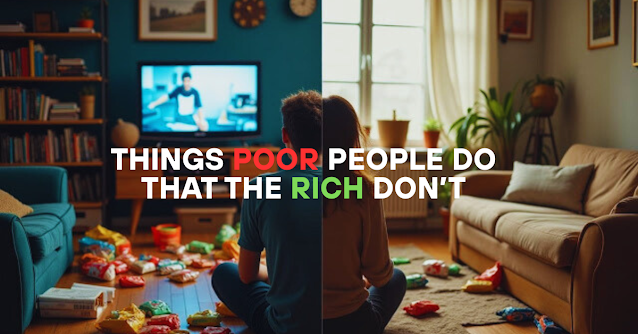15 Things Poor People Do That The Rich Don’t
In a world where financial success seems elusive for many, understanding the habits that differentiate the rich from the poor can be enlightening and transformative.
This article delves deeply into 15 distinct behaviors that are commonly associated with poor individuals, which can significantly hinder their path to wealth and success, ultimately providing insights that may inspire change and growth.
Key Takeaways
- Poor people often waste time on distractions like TV and sports.
- Health and nutrition are frequently neglected.
- Financial habits, such as spending before earning, can lead to a cycle of poverty.
- Surrounding oneself with like-minded individuals can reinforce negative behaviors.
Poor People Watch A Lot Of TV
While these forms of entertainment can be enticing and provide a temporary escape from reality, they ultimately offer little to no value when it comes to personal growth and self-improvement.
Instead of actively engaging with their own lives and pursuing meaningful activities, they become mere spectators in a world that is not their own, missing out on countless opportunities to enhance their situations and create a better future for themselves.
Poor People Eat Fast Food
Fast food is often a go-to option for individuals who are struggling financially and seeking quick meal solutions. It’s not only cheap and convenient, but it also tends to be readily available in various locations, making it an easy choice for those on a tight budget.
However, it is important to note that fast food typically lacks essential nutritional value, which can have detrimental effects on one’s overall health.
Poor eating habits, particularly those associated with a diet high in fast food, can lead to a range of serious health issues, including obesity, diabetes, and heart disease.
These health problems can, in turn, affect all areas of life—physically, mentally, and even professionally—leading to decreased productivity, lower self-esteem, and a diminished quality of life.
Poor People Buy Clothes On Sale
While saving money is important, buying clothes on sale often means purchasing items that others didn’t want. This mindset can perpetuate a cycle of mediocrity. Instead of focusing on quality and value, poor individuals may find themselves looking like they can’t afford full-price items.
Poor People Wake Up Later
There’s a common trend among the wealthy: they wake up early. Poor people, on the other hand, may struggle with motivation and productivity. Waking up late can lead to wasted time and missed opportunities for personal development.
Poor People Are Obsessed With Sports
Many poor individuals spend excessive time watching sports, which can be a form of escapism. This habit can lead to a passive approach to life, where they critique others instead of taking action themselves.
Poor People Neglect Personal Hygiene
Poor People Blame Others
A common trait among poor individuals is the tendency to blame external factors for their misfortunes. This victim mentality can prevent them from taking responsibility for their lives and making necessary changes. The rich, in contrast, often analyze their failures and learn from them.
Poor People Have No Savings
Without savings, poor individuals are often left vulnerable and unprepared for unexpected emergencies or potential opportunities that may arise.
This significant lack of a financial cushion can create a detrimental cycle of accumulating debt and heightened stress, while those who have managed to save can navigate life's challenges with greater ease and resilience, allowing them to seize opportunities and handle crises more effectively.
Poor People Use Credit Cards For Useless Purchases
Using credit cards for non-essential items can lead to financial trouble. Poor individuals may find themselves in debt for things that don’t generate income. The rich, however, tend to use credit wisely, investing in opportunities that can yield returns.
Poor People Have More Kids Early
Having children is a significant financial commitment. Poor individuals often have children at a younger age, which can strain their resources. In contrast, wealthier individuals may wait until they are more financially stable to start a family.
Poor People Skip Regular Check-Ups
Health is wealth, yet many poor individuals neglect regular medical check-ups. This can lead to undiagnosed health issues that become costly to treat later on. Staying proactive about health can prevent financial burdens down the line.
Poor People Spend Money Before They Have It
Living beyond one’s means is a common pitfall that many individuals encounter in their financial journeys.
Poor individuals may impulsively spend money they don’t have, often leading to overwhelming debt and significant financial instability.
It’s crucial to live within one’s means, carefully budgeting and saving before making any purchases, to ensure a more secure and stable financial future.
Poor People Surround Themselves With Other Poor People
The company you keep can influence your mindset. Poor individuals often associate with others who reinforce negative beliefs and behaviors. To break the cycle, it’s important to seek out those who inspire and motivate you to achieve more.
Poor People Don’t Follow Through On Ideas
Success requires not only dedication and hard work but also a strategic approach and resilience in the face of adversity.
Those who put in the effort to pursue their passions, while also navigating obstacles and seeking opportunities, are significantly more likely to achieve their goals and realize their dreams.
Poor People Expect Help From Others
Finally, many poor individuals believe that others should help them succeed. The reality is that success is often a personal journey. Taking charge of one’s life and responsibilities is essential for achieving financial independence.
In conclusion, recognizing these habits can be the first step toward change. By reflecting on these behaviors, individuals can identify areas for improvement and work towards a more prosperous future. What habits do you think hold people back from success?


.png)
.png)
.png)
.png)
.png)

.png)
.png)

.png)
0 Comments